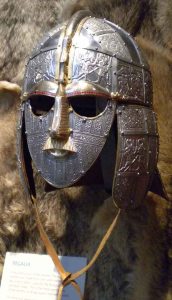I’ve just signed up to do three public lectures at the Grosvenor Museum, Chester. These are part of the Department of History and Archaeology’s Grosvenor Lunchtime Lectures. Check these out for April 2016! 
Wednesday 13 April
Tombs in Beowulf
Lecture Theatre
1-2pm
£3, pay at the door.
Why was the hero Beowulf cremated? Why was a mound raised over his ashes? This talk by Professor Howard Williams introduces the epic Anglo-Saxon poem Beowulf, its funerals and its tombs, before exploring archaeological evidence that sheds light on the material world in which the poem was composed and performed. The talk includes a new interpretation of what the dragon’s barrow and Beowulf’s own tomb meant for the poem’s early medieval audience.
Organised by the University of Chester

Wednesday 20 April
Tombs of Terror: The Hunt for Weland
Lecture Theatre
1-2pm
£3, pay at the door.
What do we know about the legendary smith Weland? The 13th-century Icelandic poem the Lay of Völundr records one version of a far older story of the magical smith, his imprisonment and subsequent violent revenge on his captures. This talk by Professor Howard Williams introduces the literary and archaeological evidence for early medieval smiths and the specific significance of the story of Völundr or Weland in the Early Middle Ages. It sheds new light on why a Neolithic chambered tomb on the Berkshire Downs became known as ‘Wayland’s Smithy’.
Organised by the University of Chester
 Wednesday 27 April
Wednesday 27 April
Powerful Tombs: The Medieval ‘Living’ Dead
Lecture Theatre
1-2pm
£3, pay at the door.
Medieval tombs allowed the dead to reach down the centuries, acquiring new narratives and identities from the Middle Ages to the present day. This talk by Professor Howard Williams explores the power of tombs in the medieval world, their destruction, translation and restoration in the modern era, and how antiquaries and archaeologists make and re-make the medieval dead as powerful components of popular culture from the 19th to the 21st centuries.
Organised by the University of Chester

I,am getting myself to chester to hear your lectures next year
Please do! The more the merrier!